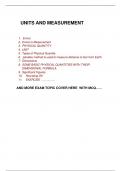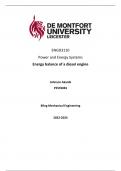Class notes
UNITS AND MEASUREMENTS COMPLETE CLASS NOTES : All Concepts, Tricks & PYQs | NEET | MDCAT | MCAT| 11th | 12th | PHYSICS
- Course
- Institution
Need for measurement: Units of measurement; systems of units; SI units, fundamental and derived units. Length, mass and time measurements; accuracy and precision of measuring instruments; errors in measurement; significant figures. Dimensions of physical quantities, dimensional analysis and its app...
[Show more]




